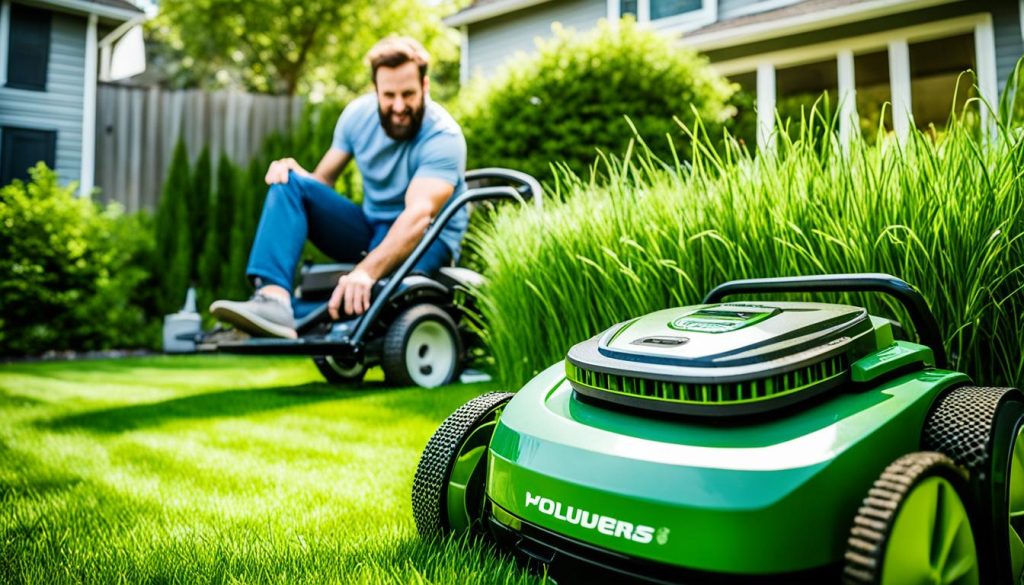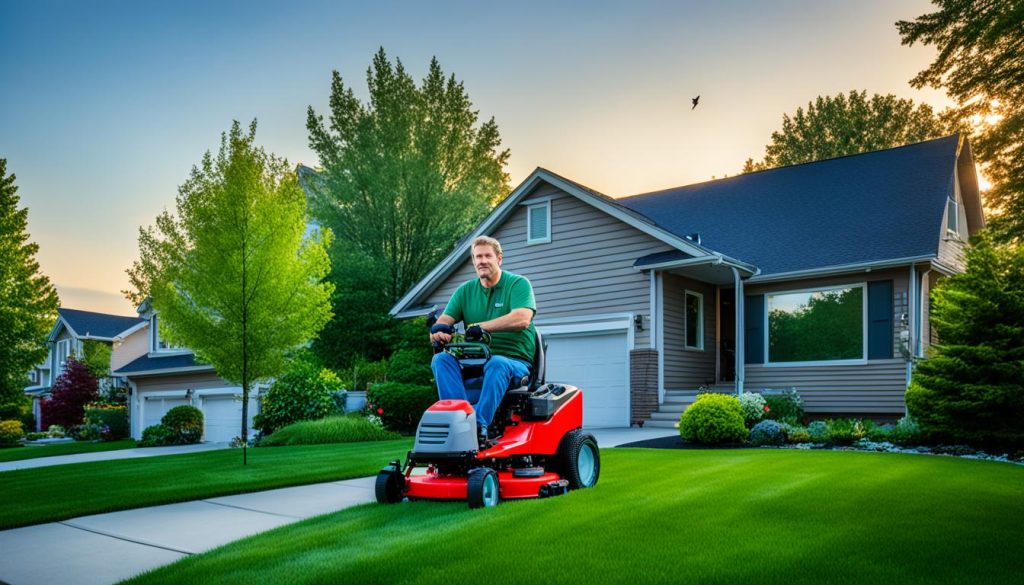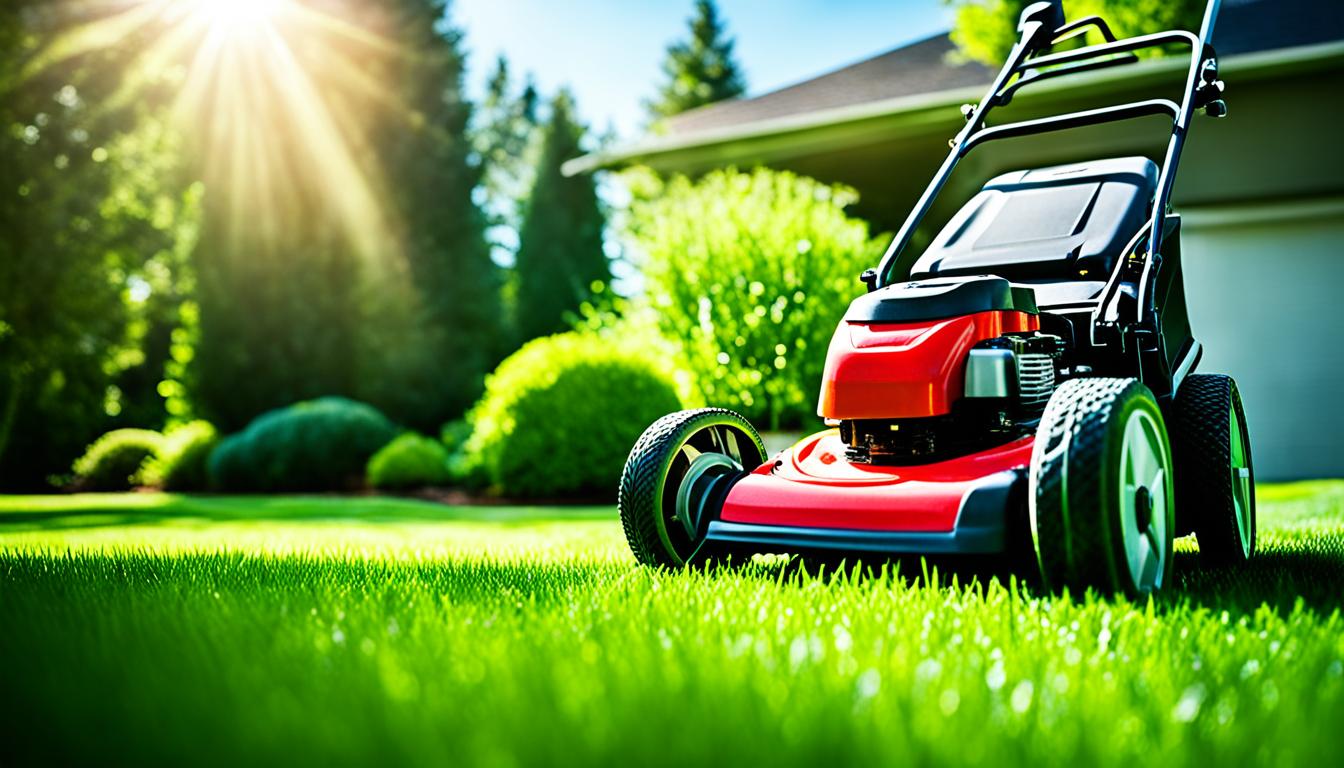Have you ever wondered what time you can legally mow your lawn? Are there specific hours when it’s acceptable to fire up your lawnmower, or do you have the freedom to mow whenever you please? The answer may surprise you.
In the United States, there is no countrywide law that restricts the times you can mow your lawn. Instead, the permissible hours for mowing are enforced locally through city or state noise ordinances and other community restrictions. These regulations aim to strike a balance between allowing residents to maintain their lawns and ensuring peace and quiet in residential areas.
So, when can you mow your lawn without causing a nuisance to your neighbors or breaking any rules? Let’s dive deeper into the topic to find out.
Key Takeaways:
- There is no countrywide law in the United States restricting the times you can legally mow your lawn.
- The times when you can mow your lawn are enforced locally through city or state noise ordinances and other community restrictions.
- Most common guidelines prohibit using loud domestic equipment such as lawnmowers between the hours of 10:00 pm and 7:00 am.
- It is important to check your local laws and codes to ensure compliance and avoid disturbing your neighbors.
- Being considerate of your neighbors and minimizing noise disturbances while mowing your lawn can have several benefits, including improved community relationships and reduced noise pollution.
Lawn Mowing Restrictions In The United States
All states, cities, and towns in the United States have specific codes called noise ordinances in place that restrict the use of loud equipment, including lawnmowers, during early morning and late evening hours. These noise ordinances vary from place to place, but generally, it is prohibited to mow your lawn between 10:00 pm and 7:00 am. The time restrictions for lawn mowing may also be adjusted for weekdays, weekends, and holidays, and can be more restrictive in urban areas. It is important to check the specific regulations in your city, state, or county to ensure compliance with the local noise ordinances.
Understanding Local Noise Ordinances And Their Purpose
Local noise ordinances are laws enacted by cities, counties, or states to regulate and control noise pollution, including noise from lawn maintenance activities. These ordinances set limits on the acceptable noise levels produced by activities such as lawn mowing. The primary purpose of these codes is to protect the well-being and quality of life of residents by minimizing noise disturbances in residential areas.
The specific regulations can include time restrictions, such as “quiet hours,” during which loud activities, like lawn mowing, are prohibited. These quiet hours typically span from late evening to early morning to ensure residents can enjoy peace and quiet during resting hours. Noise ordinances may also vary depending on the zoning of your property, with stricter regulations often applied to residential zones compared to commercial or industrial zones.
Key Features of Local Noise Ordinances:
| Features | Explanation |
|---|---|
| Time Restrictions | Specifies specific hours during which loud activities are prohibited in residential areas. |
| Noise Level Limits | Defines the maximum acceptable noise levels that can be generated by lawn maintenance activities. |
| Quiet Hours | Designates a period when residents have the right to expect peace and quiet, usually during nighttime sleeping hours. |
| Residential Zoning | Stipulates tighter regulations for noise control in residential areas compared to commercial or industrial zones. |
By adhering to these local noise ordinances, you can contribute to maintaining a peaceful and harmonious environment for yourself and your neighbors, while ensuring your lawn maintenance activities comply with the regulations in your area.
How To Find Your Local Noise Ordinance
Finding your local noise ordinance and regulations is relatively straightforward. Here are a few steps you can follow:
- Check city or county codes: Start by reviewing the noise ordinances and regulations specific to your city or county. These guidelines will outline the acceptable noise levels, permitted hours for lawn maintenance activities, and any other relevant restrictions.
- Consult HOA rules: If you live in a community governed by a homeowners association (HOA), be sure to review their rules and regulations regarding noise. HOA rules may have additional restrictions or guidelines that you need to follow.
- Contact local government offices: Reach out to your local government offices, such as the city council or county clerk’s office, to inquire about the specific noise ordinances in your area. They can provide you with the relevant information and answer any questions you may have.
- Utilize library resources: Visit your local library and consult resources such as city or county codes, zoning regulations, or noise control ordinances. Librarians can assist you in finding the necessary documents and understanding the local noise regulations.
By following these steps, you can easily find and familiarize yourself with your local noise ordinance and regulations. This will help you ensure compliance with the permissible noise levels and maintain a harmonious environment in your neighborhood.
State Or City Specific Lawn Mowing Regulations
While most noise ordinances are enacted on a local level, some states and large cities have statewide or city-specific guidelines for lawn mowing activities. These regulations aim to ensure noise control and maintain tranquility in residential areas. Understanding the specific guidelines in your state, city, or county is essential to comply with the applicable regulations. Here are a few examples of statewide and city-specific lawn mowing regulations:
California
In California, local governments are required to adopt noise ordinances that align with the state’s guidelines outlined in the California Noise Control Act. These guidelines set permissible noise levels and restrict excessive noise during certain hours, including noise from lawn mowing. It is important for Californians to consult their local noise ordinances to ensure compliance with the regulations.
New York City
New York City has its own comprehensive set of noise regulations known as the Noise Code. The Noise Code sets specific guidelines for acceptable noise levels across various activities, including lawn mowing. It specifies restrictions on lawn mowing times to maintain peace and quiet in densely populated urban areas. New Yorkers should acquaint themselves with the Noise Code to avoid any violations.
Delaware
Delaware has enacted its own regulations governing the control of noise. These regulations include restrictions on the use of lawn and garden tools during certain hours. By complying with Delaware’s noise regulations, residents can contribute to a more serene environment and build stronger communities.
Although the examples above showcase state or city-specific regulations, it is important to note that laws can vary across different jurisdictions. Therefore, it is crucial to research and familiarize yourself with the specific guidelines for your state, city, or county to ensure compliance with the applicable regulations.
To provide a visual overview, here’s a table summarizing the statewide lawn mowing guidelines in California, the New York City Noise Code, and Delaware’s Regulations Governing the Control of Noise:
| State/City | Specific Guidelines |
|---|---|
| California | Noise ordinances aligned with the California Noise Control Act |
| New York City | Noise Code with specific guidelines for acceptable noise levels |
| Delaware | Regulations governing the control of noise, including restrictions on lawn and garden tools during certain hours |
Tips For Reducing Lawn Mowing Noise And Disturbance
Mowing your lawn within the legally permissible hours is important, but it’s also considerate to minimize noise disturbances for your neighbors. Here are some tips to help reduce the noise and disturbance caused by lawn mowing:
- Choose a quieter lawnmower: Look for lawnmower options that are specifically designed to reduce noise. Many manufacturers now offer quieter models that can help minimize the impact on your neighbors.
- Maintain your lawn mower: Proper lawn mower maintenance can make a significant difference in noise reduction. Regularly clean the cutting blades, replace worn-out parts, and ensure the mower is well-oiled and functioning efficiently.
- Mow during daytime hours: If possible, try to schedule your lawn mowing during the daytime when people are typically awake and engaged in daily activities. This can help minimize disturbances during early morning or late evening hours when neighbors may be trying to sleep or relax.
- Mow at consistent intervals: By maintaining a regular mowing schedule, you can prevent the grass from growing too long and requiring more aggressive mowing. Shorter grass requires less effort from the mower, resulting in reduced noise.
- Consider manual or electric options: Manual reel mowers and electric mowers tend to be quieter compared to traditional gas-powered ones. If noise is a concern, exploring these alternatives may offer a more peaceful mowing experience.
- Mind your landscaping: Proper landscaping can also contribute to noise reduction. Consider planting shrubs, trees, or installing a fence as a sound barrier between your lawn and neighboring properties. These natural barriers can help absorb and deflect noise.
By implementing these tips, you can contribute to a quieter and more considerate lawn mowing experience for everyone in your community.

The Benefits of Adhering to Noise Ordinances
Adhering to local noise ordinances while maintaining your lawn has several benefits:
- Improved community relationships: Being considerate of your neighbors and minimizing disturbances creates a positive environment and fosters good relationships within your community.
- Reduced noise pollution: Following noise ordinances contributes to a quieter and more peaceful neighborhood, enhancing the overall quality of life for everyone.
- Avoiding fines or penalties: Non-compliance with noise ordinances can result in fines, penalties, or even legal action. By following these regulations, you can prevent unnecessary expenses and legal issues.
- Encouraging others to follow suit: By setting an example and adhering to noise ordinances, you may inspire your neighbors to do the same, contributing to a quieter and more harmonious community.
Adhering to these regulations not only benefits you as an individual but also creates a more pleasant and considerate living environment for everyone in your community. It’s essential to prioritize community relationships, minimize noise pollution, avoid fines or penalties, and encourage others to follow noise regulations for a harmonious neighborhood.
The Science Behind Morning Mowing
Mowing your lawn early in the morning, particularly between 6 and 8 a.m., may not be the best time for several reasons. Firstly, the grass is often wet with dew, which can cause the lawnmower to “rip” the grass instead of cutting it cleanly, resulting in clumps, tracks, and matted grass. This can create further problems, such as promoting the growth of mold and fungus on the damaged grass. Mowing during these wet conditions can be detrimental to your lawn’s health and appearance.
Mowing wet grass can lead to grass bruising, which occurs when the grass is torn instead of being precisely cut. The tearing can cause the grass blades to become damaged, resulting in an uneven and unsightly appearance. Furthermore, the wet conditions create an environment that is conducive to the growth of mold and fungus. These microorganisms thrive in moist environments and can quickly spread across the damaged grass, leading to diseases that can be challenging to eradicate.
The Ideal Time for Mowing: 8 to 10 A.M.
The period from 8 to 10 a.m. is considered one of the best times for mowing your lawn. During this time, the grass has had a chance to dry out, ensuring a dry surface to work with. Dry grass is easier to cut evenly without tearing or bruising, resulting in a more aesthetically pleasing lawn. Mowing in the morning also allows the grass to recover and heal before cooler temperatures set in during the evening.
Another advantage of mowing between 8 and 10 a.m. is that most neighbors are either at work or awake and engaged in their daily activities. This reduces the risk of potential disturbances or noise complaints, ensuring a peaceful mowing experience for everyone.
The Benefits of Mowing in the Morning:
- Optimal mowing time: Mowing during this period allows you to take advantage of dry grass and achieve even cutting results.
- Dry grass: By mowing when the grass is dry, you can prevent clumping, tracks, and other unsightly results that can occur when mowing wet grass.
- Minimal disturbances: Choosing morning hours for mowing ensures that most neighbors are either at work or awake, reducing the potential for noise complaints or disturbances.
In summary, setting aside time between 8 and 10 a.m. for mowing your lawn provides optimal mowing conditions, with dry grass and minimal disturbances. This allows you to achieve an even, well-manicured lawn while being considerate of your neighbors. Take advantage of this ideal mowing time to maintain a beautiful outdoor space without compromising community harmony.
Mowing in the Afternoon: Pros and Cons
Mowing your lawn in the afternoon, specifically between 10 a.m. and 4 p.m., can be a suitable time for lawn maintenance. However, it’s important to consider the pros and cons associated with mowing during this period.
Pros of Afternoon Mowing
- Flexibility: Afternoon mowing allows for greater flexibility in your schedule, especially if you have work or other commitments in the morning.
- Grass Growth: Lawns tend to exhibit faster growth during the morning, so mowing in the afternoon allows you to cut the grass at its peak height.
- Visual Appeal: Freshly mowed lawns in the afternoon can enhance the curb appeal of your property, particularly if you have guests or an event planned.
Cons of Afternoon Mowing
- Lawn Stress: One of the biggest challenges of mowing in the afternoon is the high temperatures during the middle of the day. Both you and the grass can experience the effects of heat stress more intensely during this time. It’s important to stay hydrated and take breaks if needed.
- Height Considerations: Mowing your lawn too short during the hot afternoon hours can lead to additional stress on the grass and make it more susceptible to damage and weed growth. It’s essential to adjust your mower’s cutting height accordingly.
- Noise Concerns: As with any time of day, mowing in the afternoon may produce noise that could disturb your neighbors. It’s important to be mindful of local noise regulations and considerate of those around you.
In summary, mowing your lawn in the afternoon can provide flexibility and contribute to the visual appeal of your property. However, it’s crucial to be aware of the challenges and take proactive measures to minimize lawn stress and noise disturbances.
Evening Mowing: 5 to 8 P.M.
Mowing your lawn in the evening, specifically between 5 and 8 p.m., offers several advantages. Firstly, the temperature has dropped, making it more comfortable for you to mow. Secondly, the mower’s blades are less likely to cause significant stress to your grass, giving it time to recover before sunset. Lastly, mowing during this time is often considered more neighbor-friendly, as most people are indoors at this hour. This can help minimize noise disturbances and maintain a harmonious relationship with your neighbors. If you need to mow your lawn in the summer heat, starting later in the evening when the day cools off is a good idea.

| Advantages of Evening Mowing |
|---|
| 1. Cooler temperatures for more comfortable mowing |
| 2. Less stress on the grass due to cooler evening temperatures |
| 3. Considered more neighbor-friendly as most people are indoors |
How Chorbie Can Help
When it comes to maintaining a well-groomed lawn and being considerate of your neighbors, Chorbie is here to assist you. As a professional lawn care service, Chorbie understands the importance of mowing your lawn at the right time and with expert precision. Their experienced team is dedicated to providing considerate lawn care services that align with the permissible hours and accommodate your neighbors’ expectations.
One of the key ways Chorbie can assist you is by helping you establish a mowing schedule that ensures your lawn is maintained without causing disturbances. With their in-depth knowledge of local noise regulations, they can guide you in adhering to the specific mowing hours set by your city, county, or state. By following these regulations, you can have peace of mind knowing that you are being a considerate neighbor.
Chorbie’s commitment to expert precision extends to their lawn care practices. Their team of professionals utilizes advanced techniques and equipment to mow your lawn with optimal precision, ensuring a well-maintained and aesthetically pleasing result.
To create a customized plan for hassle-free and considerate lawn maintenance, reach out to a Chorbie expert today. They will listen to your lawn care needs and provide tailored solutions that meet your requirements. With Chorbie’s assistance, you can enjoy a beautifully maintained lawn while being considerate of noise regulations and your neighbors’ expectations.
Make the most of Chorbie’s lawn mowing service, expert precision, and commitment to considerate lawn care. Contact them today to experience the convenience and peace of mind that professional lawn care can bring.
| Benefits | Features |
|---|---|
| Expert Precision | – Skilled and experienced professionals |
| – Advanced techniques and equipment for precise mowing | |
| Lawn Mowing Schedule | – Customize mowing frequency to meet your lawn’s needs |
| – Accommodate permissible mowing hours | |
| Considerate Lawn Care | – Adherence to noise regulations |
| – Minimize disturbances to your neighbors |
Conclusion
Adhering to local noise ordinances and understanding the permissible lawn mowing hours is crucial for maintaining good relationships with your neighbors and complying with the regulations in your city, county, or state. While there is no countrywide law on lawn mowing times, most cities and towns have specific noise ordinances that restrict the use of loud equipment like lawnmowers during early morning and late evening hours.
By being considerate in your lawn care activities and following the guidelines set by your local noise ordinances, you can ensure a pleasant living environment for yourself and your neighbors, while maintaining a well-groomed lawn. Checking your local laws and codes is essential to avoid causing a nuisance or breaking any rules. Remember to be mindful of permissible lawn mowing hours and respect quiet hours to minimize noise disturbances.
With proper awareness of local noise regulations and lawn care regulations, you can enjoy the benefits of a well-maintained lawn while being a considerate member of your community. By adhering to noise ordinances and being respectful of your neighbors’ peace and quiet, you contribute to a harmonious living environment for everyone.





